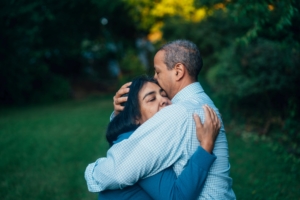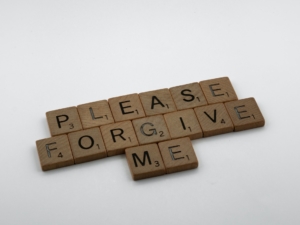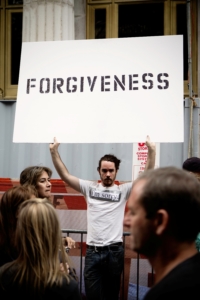Unforgiveness and Its Effect on Our Lives
The idea of dishing out our own brand of justice is a tale as old as time, and it finds expression in comic books, movies, books, and in our lives. Some of our favorite pop culture heroes are the vigilantes who serve justice outside the lines of the law.
 The Guy Ritchie-directed movie Snatch, starring Brad Pitt and Jason Statham among others, put an interesting definition of the word “nemesis” in the mouth of one of its foul-mouthed characters, a gangster named Bricktop. Bricktop, in one of his many memorable pieces of dialogue, said something like this: “Do you know what nemesis means? A righteous infliction of retribution manifested by an appropriate agent. Personified in this case by . . . me.”
The Guy Ritchie-directed movie Snatch, starring Brad Pitt and Jason Statham among others, put an interesting definition of the word “nemesis” in the mouth of one of its foul-mouthed characters, a gangster named Bricktop. Bricktop, in one of his many memorable pieces of dialogue, said something like this: “Do you know what nemesis means? A righteous infliction of retribution manifested by an appropriate agent. Personified in this case by . . . me.”
When someone wounds or offends us or the people we love, it is natural for us to want to retaliate, to inflict retribution. Sometimes, we feel like fixing things ourselves will be the best and quickest way to see justice done. Bricktop, for his part, thought himself to be a proper agent of righteous retribution, even though under the circumstances he was far from being righteous.
Set that next to the notion of forgiveness, which doesn’t often sit well with us, especially when we’re deep in our feelings about a situation. Forgive that person who just insulted me, my faith, or my people? Forgive that person who just rudely cut me off in traffic and then had the gall to insult me and my driving?
It’s often difficult enough to forgive our loved ones, but to forgive those we would call our enemies? That seems like a bridge too far. In those moments, it seems to make more sense to follow the way of Bricktop than it does to follow the way of Jesus.
What unforgiveness does to us
Every action we undertake has an impact on our lives. On the other side of that is the reality that whatever our hearts are full of will emerge out of our mouths and into our lives, showing us what’s going on inside of us.
For the mouth speaks what the heart is full of. A good person brings good things out of the good stored up in them, and an evil person brings evil things out of the evil stored up in them. – Matthew 12:34-35
Forgiving people is hard. We are concerned, and rightly so, that they will hurt us again, that forgiving them will seem like condoning their behavior, or that forgiving them will allow them to keep doing what they did. It is understandable that faced with the choice between offering forgiveness and withholding it, we often withhold it and live in a state of unforgiveness.
What, though, is the effect of unforgiveness on our lives?
It creates a barrier between us and God
 In our own lives, we make many, many mistakes. We are repeat offenders in God’s books, and we find ourselves often at the throne of grace asking God for forgiveness. In the prayer he taught his followers, Jesus taught them to ask God for forgiveness even as they pray for daily bread (Matthew 6:9-15).
In our own lives, we make many, many mistakes. We are repeat offenders in God’s books, and we find ourselves often at the throne of grace asking God for forgiveness. In the prayer he taught his followers, Jesus taught them to ask God for forgiveness even as they pray for daily bread (Matthew 6:9-15).
If we know ourselves well and are honest, we should acknowledge that we need forgiveness from God and other people often. God is gracious and freely forgives us, casting our sins away from us as far as the east is from the west.
The challenging part for us is that God asks us to extend forgiveness to others in the same way that he forgives us. What we have received, we are to pass on and bless others with.
So, that prayer for forgiveness that Jesus taught his followers goes, “Give us this day our daily bread, and forgive us our debts, as we also have forgiven our debtors…” and he closes off the conversation by saying, “For if you forgive others their trespasses, your heavenly Father will also forgive you, but if you do not forgive others their trespasses, neither will your Father forgive your trespasses” (Matthew 6:11-12, 14-15).
When we withhold forgiveness from other people and live in a state of unforgiveness, it brings a challenge to our relationship with God. As one interpretation of these verses puts it, “In prayer, there is a connection between what God does and what you do. You can’t get forgiveness from God, for instance, without also forgiving others. If you refuse to do your part, you cut yourself off from God’s part”.
We exist in a complex web of relationships. God cares about what happens between us and our neighbors, and we can’t isolate or insulate our relationship with them from our relationship with God. The new life God gives us enables us to live in harmony with others and empowers us to do the impossible, like forgiving people.
It’s bad for your health
 Forgiveness is connected to massive health benefits. Johns Hopkins Medicine notes that “Studies have found that the act of forgiveness can reap huge rewards for your health, lowering the risk of a heart attack; improving cholesterol levels and sleep; and reducing pain, blood pressure, and levels of anxiety, depression, and stress. And research points to an increase in the forgiveness-health connection as you age.”
Forgiveness is connected to massive health benefits. Johns Hopkins Medicine notes that “Studies have found that the act of forgiveness can reap huge rewards for your health, lowering the risk of a heart attack; improving cholesterol levels and sleep; and reducing pain, blood pressure, and levels of anxiety, depression, and stress. And research points to an increase in the forgiveness-health connection as you age.”
“There is an enormous physical burden to being hurt and disappointed,” says Karen Swartz, M.D., director of the Mood Disorders Adult Consultation Clinic at The Johns Hopkins Hospital. Chronic anger puts you into a fight-or-flight mode, which results in many changes in heart rate, blood pressure, and immune response.
Those changes, then, increase the risk of depression, heart disease, and diabetes, among other conditions. Forgiveness, however, calms stress levels, leading to improved health.”
Living in unforgiveness and holding on to negative feelings about other people is bad for your health.
It robs us of the freedom God intends
One of the gifts that God has given people in Jesus is freedom. That freedom takes shape in different ways, but one of the surprising ways is that we are freed from our old selves, which were prone to feelings such as “bitterness, rage, anger, harsh words, and slander” (Ephesians 4:31). These are part of the old way of life.
That doesn’t mean that no situation will arise where we feel those things. Living out the life of God in us means that we give less and less room to those negative emotions, and learn more and more to “be kind to each other, tenderhearted, forgiving one another, just as God through Christ has forgiven [us]” (Ephesians 4:32).
Feeling angry toward someone as a result of unforgiveness can be so draining. As we’ve already pointed out, unforgiveness includes a heavy physical burden to carrying those emotions all day. Feeling anger and resentment toward other people also just wears down your soul and  robs you of your joy. Have you ever noticed what happens when you’re in a good mood, and a person you have something against walks in the room?
robs you of your joy. Have you ever noticed what happens when you’re in a good mood, and a person you have something against walks in the room?
All your energy gets taken away from the happiness you were feeling and is redirected toward avoiding that person’s gaze or just wanting to get out of there as quickly as possible. That’s a burden. Rather than carry that, God’s people can be sure that God will take up our cause and do what is right at the right time, so we don’t have to burden ourselves with holding onto our anger and wanting revenge (Romans 12:14-21).
It affects relationships and causes us to miss what God is doing
The story of the lost son in Luke 15 is a remarkable one about people finding a way back from a very dark place. The younger son in the story is wayward, and he squanders the family wealth on alcohol, parties, and fast living. He brings shame to his father and the family. The older son stayed home all the while, faithfully working the fields.
When the younger brother ran out of money and lost his friends, he thought to come home and restore some semblance of a relationship with his father. The wayward younger brother in the story stood for the tax collectors and sinners that Jesus was welcoming and eating with.
The older brother, standing for the religious leaders, angrily stood far off from the wayward brother, and would not extend forgiveness, welcome, or rejoice when the generous father had welcomed the wayward son home.
Was the wayward son wrong in what he had done? Yes, very much so. Is it natural and normal to feel offended, much like the older brother did in these circumstances? Yes. But in that story, Jesus was trying to show that the joy of welcoming back a wayward brother who has repented ought to overtake our offense at what they did.
The Pharisees were unwilling to welcome the tax collectors and sinners even when God in Jesus was welcoming them into the Kingdom. Choosing to forgive isn’t easy, but living in unforgiveness made them, and it can make us, miss out on what God is doing.
“Love At All Costs”, Courtesy of Gus Moretta, Unsplash.com, CC0 License; “Let It Go”, Courtesy of Brett Jordan, Unsplash.com, CC0 License; “Please Forgive Me”, Courtesy of Brett Jordan, Unsplash.com, CC0 License; “Forgiveness”, Courtesy of Felix Koutchinski, Unsplash.com, CC0 License




